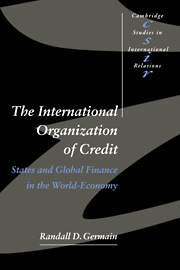Book contents
- Frontmatter
- Contents
- List of figures and tables
- Preface
- Note on figures and tables
- Glossary
- 1 Routes to international political economy: accounting for international monetary order
- Part 1 The international organization of credit in historical perspective
- Part 2 The contemporary international organization of credit
- 4 The era of decentralized globalization
- 5 Decentralized globalization and the exercise of public authority
- 6 Finance, power, and the world-economy approach: towards an historical–institutional international political economy
- Appendix: Top merchant/investment banks, by city and era
- References
- Index
- CAMBRIDGE STUDIES IN INTERNATIONAL RELATIONS
5 - Decentralized globalization and the exercise of public authority
Published online by Cambridge University Press: 14 January 2010
- Frontmatter
- Contents
- List of figures and tables
- Preface
- Note on figures and tables
- Glossary
- 1 Routes to international political economy: accounting for international monetary order
- Part 1 The international organization of credit in historical perspective
- Part 2 The contemporary international organization of credit
- 4 The era of decentralized globalization
- 5 Decentralized globalization and the exercise of public authority
- 6 Finance, power, and the world-economy approach: towards an historical–institutional international political economy
- Appendix: Top merchant/investment banks, by city and era
- References
- Index
- CAMBRIDGE STUDIES IN INTERNATIONAL RELATIONS
Summary
Shortly after the demise of Bretton Woods, one of its original architects could still comment that “the key problem of the international monetary system is to maintain an appropriate pattern of exchange rates, particularly among the large industrial countries” (Bernstein, 1972: 52). The argument of this chapter is that, while clearly important, maintaining stable exchange rates can no longer be considered the key preoccupation of public authorities; they must also attend to the way in which credit is organized internationally. Two kinds of public agencies are primarily responsible for exercising public regulatory authority over financial institutions: central banks and treasuries. While the relationship between the two kinds of agencies is complicated and overlapping, treasuries have largely concentrated upon the long-term exchange rates of their currencies and issues of capital mobility, while central banks have attempted to control the availability of credit and liquidity in their national financial systems and manage currency parities on a daily basis.
The overlap between the operations of these two agencies can be demonstrated in several ways. On the one hand, the determination of proper exchange rate levels by treasuries has a powerful impact upon the movement of funds into and out of currencies, and hence on the immediate availability of credit and liquidity to national financial systems. Equally important, long-term investors resist public and private investments in areas with volatile currencies, simply because of the uncertainty involved. In the case of public investments, they may demand a risk premium that makes borrowing for public use prohibitively expensive.
- Type
- Chapter
- Information
- The International Organization of CreditStates and Global Finance in the World-Economy, pp. 137 - 161Publisher: Cambridge University PressPrint publication year: 1997



